初一教材 一般疑问句语法点
七年级一般疑问句的知识点
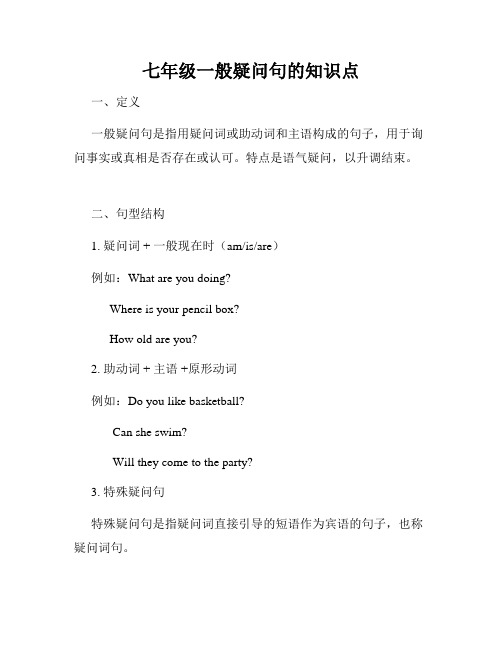
七年级一般疑问句的知识点一、定义一般疑问句是指用疑问词或助动词和主语构成的句子,用于询问事实或真相是否存在或认可。
特点是语气疑问,以升调结束。
二、句型结构1. 疑问词 + 一般现在时(am/is/are)例如:What are you doing?Where is your pencil box?How old are you?2. 助动词 + 主语 +原形动词例如:Do you like basketball?Can she swim?Will they come to the party?3. 特殊疑问句特殊疑问句是指疑问词直接引导的短语作为宾语的句子,也称疑问词句。
疑问词包括:who, what, when, where, which, how, how much/many等例如:Where do you live?How many sisters do you have?Who is your teacher?三、回答一般疑问句的回答有两种情况:1. Yes或No 回答例如:Do you like music? Yes, I do. / No, I don’t.Is your father a doctor? Yes, he is. / No, he isn’t.2. 对照回答例如:What are you doing? I am reading a book.How old are you? I am thirteen years old.Where is your bag? It’s under the desk.四、注意事项1. 疑问词是动词或介词时,要注意词序,其它疑问词则不需要注意例如:What are you looking for?Who are you talking to?2. 如果特殊疑问句中在句中作主语或者宾语的疑问词是人,那么将其作为主语或宾语,谓语动词要用复数形式。
初一一般疑问句及特殊疑问句
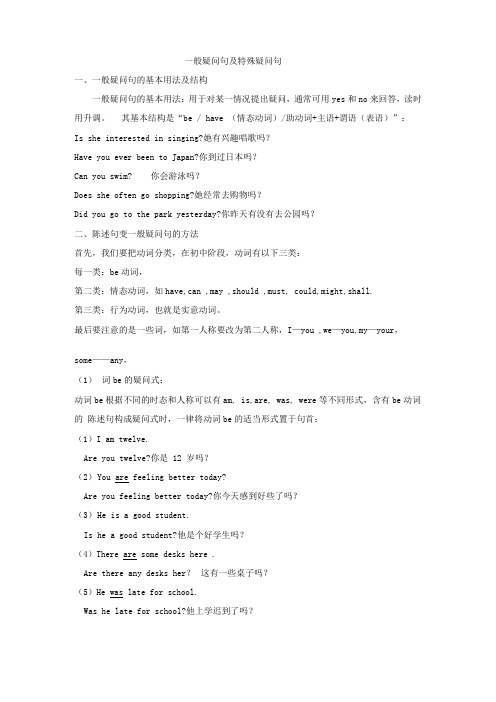
一般疑问句及特殊疑问句一、一般疑问句的基本用法及结构一般疑问句的基本用法:用于对某一情况提出疑问,通常可用yes和no来回答,读时用升调。
其基本结构是“be / have (情态动词)/助动词+主语+谓语(表语)”:Is she interested in singing?她有兴趣唱歌吗?Have you ever been to Japan?你到过日本吗?Can you swim? 你会游泳吗?Does she often go shopping?她经常去购物吗?Did you go to the park yesterday?你昨天有没有去公园吗?二、陈述句变一般疑问句的方法首先,我们要把动词分类,在初中阶段,动词有以下三类:每一类:be动词,第二类:情态动词,如have,can ,may ,should ,must, could,might,shall.第三类:行为动词,也就是实意动词。
最后要注意的是一些词,如第一人称要改为第二人称,I—you ,we—you,my—your,some——any,(1)词be的疑问式:动词be根据不同的时态和人称可以有am, is,are, was, were等不同形式,含有be动词的陈述句构成疑问式时,一律将动词be的适当形式置于句首:(1)I am twelve.Are you twelve?你是 12 岁吗?(2)Y ou are feeling better today?Are you feeling better today?你今天感到好些了吗?(3)H e is a good student.Is he a good student?他是个好学生吗?(4)There are some desks here .Are there any desks her?这有一些桌子吗?(5)He was late for school.Was he late for school?他上学迟到了吗?2.情态动词:如 can ,may ,should ,must, could,might,shall. (1)You can speak English.Can you speak English?你会说英语吗?(2)I must finish the work at once.Must I finish the work at once?我必须马上完成工作吗?(3)He should stay at home?Should he stay at home? 他必须呆在家吗?(5)She may be at home.May she be at home? 她可能在家吗?(6)He used to get up late.Used he to get up late?他通常起床很迟吗?3.实意动词的疑问式:含有一般实意动词的陈述句,通常应根据不同时态和人称在句首加助动词do, does, did等.一般现在时用do ,does,(第一人称,第二人称,所有的复数人称用do,第三人称单数用does), 一般过去时用did.(1)I go to school from Monday to Friday.Do you go to school from Monday to Friday? 你周一到周五都上学吗?(2) They come to school by bus.Do they come to school by bus ? 他们是坐公车上学吗?(3)The boy likes dancing.Does the boy like dancing? 这男孩喜欢唱歌吗?(4) Jim and Tom have dinner at 7o’ clock.Do Jim and Tom have dinner at 7o’ clock?吉姆和汤姆是 7 点吃晚餐吗? (5)She saw the film last night.Did she see the film last night? 她昨晚看了这部电影吗?(6)They did their homework just now.Did they do their homework just now? 他们刚刚做了家庭作业吗?陈述句变一般疑问句练习根据句后括号内的要求,填入句中所缺的词:1.I know the answer.(一般疑问句)know the answer?2.We can see some birds.L般疑问句)see birds?3.There is a computer in my house.(一般疑问句)a computer in house?4.There are some flowers on the teachers'desk.(一般疑问句)flowers on the teachers,desk?5.There are some apples on the 仃©6.(否定式)There apples on the tree.1.I think he is very 01d.(否定句)I think he very old.7.Please colour it 8100口.(否定句)colour it green.8.We can speak good English.变否定句)We speak good English.9.Thank you for helping me.(同义句) Thank you for.10.The re aren,t any pears in m©八乂(同义句)T here are pears in the box.11.Whose are these clothes?(同义句)are these?12.Let me look at your book.(同义句) ________________________________ Let me y our book.13.Her sweater is red.(对划线部分提问)is her sweater?14.My pencils are in the pencil-box.(对划线部分提问)your pencils?1.1I get up at six every day.(对划线部分提问)do you get up every day?16.There are fifty students in my class.(对划线部分提问) students are there in your class?17.These are cars.(用buses 改写成选择疑问句)A re these cars?18.The book is in my schoolbag.(变否定疑问句) the book in your school-bag?19.Two boys are in our house.(改为there be 句型)two boys in our house.20.Can't you find the 作葡定回答) ,I.陈述句变一般疑问句:1.His father is an English teacher.2.These cats are crying.3.They can swim.4.I like to read English.5.I go to school on foot.6.He likes English.7.His father goes to work by bus.8.He is crying under the tree.9.His birthday is on the twentieth of November.10.Mrs. Li and Kitty are in a big shop.11.Kitty is wearing her new uniform.12.The boy under the tree is hungry.13.He goes to school every day.15.I want to have a model car.16.She wants a cup of coffee.17.Mrs. Li and Kitty watch television at night.18.I do my homework after school.陈述句变一般疑问句练习21.Everybody is in the classroom.2.The boy does some housework at home.3.The children had a good time in the park.4.Jim has some story-books.5.Mr. Hunt told us something important at the meeting.6.The old man does morning exercises every morning.7.We are from China.8.I must finish my homework before eight o'clock.9.He often goes to the library on Sundays.10.They have a class meeting every week.特殊疑问句一、填入所缺的疑问词1.do you like summer? Because I can swim. cinema. 3.-------- can I get to Zhong Shan Park? By underground. 5.---------- b ag is on the desk?.Xiao Zhang,s. 7.will go with you? ChenJie. It’s 100 yuan. 二、选词填空 1. (What date,What day) is it today?2. (What date, what day) is today?3.4.5. ------------------6.7.8. ------------------9.. ____________ 10. . ____________ (How far , How long ) is your school?(How many , How much )orange juice can you buy? (Which , What ) fruit do you like? (Who , Whose ) is that boy? (Which , where) floor do you live?(How often , How long) do you go swimming ? (Howoften, How soon ) will you get to the forest? (How far, How fast) can he swim in one minute?三、.对划线部分提问1 .They bought a new bike yesterday. 3.The girl in red is my cousin.5.She made a living by selling newspapers. 7.There were 50_students in our class last term. 2. --------- i s the post office? It,s next to the4.are you? I,m 14 years old 6 book is Sarah's? The yellow one.8 is your skirt,Amy?It,s Monday. It,s May 27th It's ten minutes' walk. A little. Apples. He is Mike. The fifth floor. Three times a week.In one week. 600 metres.2. She is a nurse .4.He read the book for three hours.6. Julia often talks with me after class.8.They come from Hubei .四、选择题1. ( ) Excuse me is the nearest bookshop? Go down the street and turn left .A. howB. whatC. whereD. who2.()is a ticker for the film Hacker He? About forty yuan .A. How oldB. How manyC. How muchD. How often3.()—are you going? — I ,m going to the library.A. WhoB. WhichC. WhatD. Where4.()?----It ,s eight.A. What day is itB. What ,s five and threeC. How old are youD. What ,s your telephone number 5.() —?—I ,ve got a headache and a cough.A. What ,s the matter with youB. What ,s wrong with itC. Can I help youD. Howare you6. ( ) .-tea did you have? ——Two cups.A. How manyB. How muchC. How soonD. Which 7.() --a year does your school have sports meetings?--- Twice a year.A. How oftenB. How soonC. How longD. How many times9.Tim went to school late because he got up late. 11. Li Hui goes to school by light rail. 13. Let's meet at 7:30 tomorrow morning. 15. The book cost me nine dollars.17. Two plus four is six. factory.19.He is feeling well.10.It is windy .12. I wash it twice a week .14.The movie was wonderful.16 He will be back in four days .18. He often has lunch in the20. Dick hurt his leg last Sunday.8.( )--? ---- The one behind the tree.A. Whose girlB. Who,s that girlC. Which girlD. Where,s the girl9.( ) -are you going to be in the future? I want to be a person Yang Liwei.A. How , likeB. How , asC. What , likeD. What , as10.( ).will your father be back?.A How longB how oftenC How soonD How wide五、按要求改写句子(对划线部分提问)1.They meet each other once a month.they meet each other?2.Tony went swimming last Thursday.Tony swimming?3.My cousin looks like a sportsman. your cousin look?4.The short play was wonderful.did you the short play?did you the short play?5.Our party lasted three hours. did your party last?6.I watched the variety show on TV. did you watch on TV?1.1t's Tuesday. is it today?8.The supermarket is about five minutes' walk. is the supermarket?9.They went to the park by bus. they go to the park?10.Bob surfed the Internet for forty minutes yesterday morning.Bob surf the Internet yesterday morning?。
七年级上册英语正式篇第三单元知识点
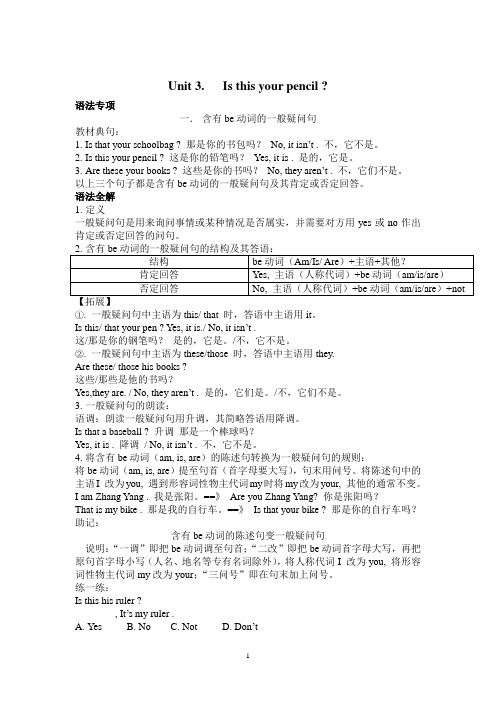
Unit 3. Is this your pencil ?语法专项一.含有be动词的一般疑问句教材典句:1.Is that your schoolbag ? 那是你的书包吗?No, it isn’t . 不,它不是。
2.Is this your pencil ? 这是你的铅笔吗?Yes, it is . 是的,它是。
3.Are these your books ? 这些是你的书吗?No, they aren’t . 不,它们不是。
以上三个句子都是含有be动词的一般疑问句及其肯定或否定回答。
语法全解1.定义一般疑问句是用来询问事情或某种情况是否属实,并需要对方用yes或no作出肯定或否定回答的问句。
2.含有be动词的一般疑问句的结构及其答语:结构be动词(Am/Is/ Are)+主语+其他?肯定回答Yes, 主语(人称代词)+be动词(am/is/are)否定回答No, 主语(人称代词)+be动词(am/is/are)+not 【拓展】①. 一般疑问句中主语为this/ that 时,答语中主语用it。
Is this/ that your pen ? Yes, it is./ No, it isn’t .这/那是你的钢笔吗?是的,它是。
/不,它不是。
②. 一般疑问句中主语为these/those 时,答语中主语用they.Are these/ those his books ?这些/那些是他的书吗?Yes,they are. / No, they aren’t . 是的,它们是。
/不,它们不是。
3.一般疑问句的朗读:语调:朗读一般疑问句用升调,其简略答语用降调。
Is that a baseball ? 升调那是一个棒球吗?Yes, it is . 降调/ No, it isn’t . 不,它不是。
4.将含有be动词(am, is, are)的陈述句转换为一般疑问句的规则:将be动词(am, is, are)提至句首(首字母要大写),句末用问号。
一般疑问句知识点
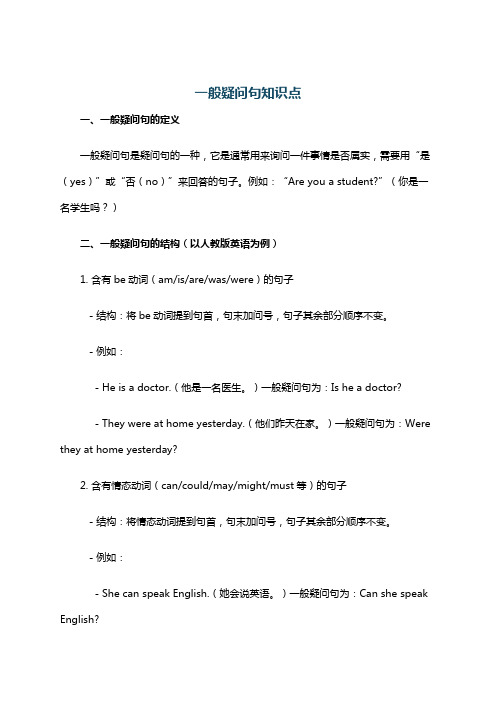
一般疑问句知识点一、一般疑问句的定义一般疑问句是疑问句的一种,它是通常用来询问一件事情是否属实,需要用“是(yes)”或“否(no)”来回答的句子。
例如:“Are you a student?”(你是一名学生吗?)二、一般疑问句的结构(以人教版英语为例)1. 含有be动词(am/is/are/was/were)的句子- 结构:将be动词提到句首,句末加问号,句子其余部分顺序不变。
- 例如:- He is a doctor.(他是一名医生。
)一般疑问句为:Is he a doctor?- They were at home yesterday.(他们昨天在家。
)一般疑问句为:Were they at home yesterday?2. 含有情态动词(can/could/may/might/must等)的句子- 结构:将情态动词提到句首,句末加问号,句子其余部分顺序不变。
- 例如:- She can speak English.(她会说英语。
)一般疑问句为:Can she speak English?- You must go to school on time.(你必须按时上学。
)一般疑问句为:Must you go to school on time?3. 含有实义动词(行为动词)的句子(一般现在时和一般过去时)- 一般现在时- 当主语为非第三人称单数(I/you/we/they等)时,结构为:Do+主语+动词原形+其他?- 例如:I like apples.(我喜欢苹果。
)一般疑问句为:Do you like apples?- 当主语为第三人称单数(he/she/it等)时,结构为:Does+主语+动词原形+其他?- 例如:He likes reading.(他喜欢阅读。
)一般疑问句为:Does he like reading?- 一般过去时- 结构为:Did+主语+动词原形+其他?- 例如:They played football yesterday.(他们昨天踢足球了。
一般疑问句的四种基本句型

一般疑问句的四种基本句型一般疑问句的四种基本句型:【句型一】Be + 主语+ …;【句型二】Do / Does / Did + 主语+ 谓语+…;【句型三】情态动词+ 主语+ 谓语+…;【句型四】Have / Has + 主语+ 功去分词+…。
【句型一】Be + 主语+ …?例句:1.Are these books on the desk? 这些书在桌子上吗?2.Is your mother at home? 你妈妈在家吗?3.Was he here a moment ago? 他刚才在这儿吗?【用法说明】在含有连系动词be的未来时(shall / will + be) 或完成时态(have / has + been) 的句子,改为一般疑问句时,只需将shall / will 或have / has提到句首。
如:1.Will they be at home tonight? 他们今晚在家吗?2.Has he been to New York? 他去功纽约吗?【句型二】Do / Does / Did + 主语+ 谓语+…?例句:1.Do you like English? 你喜欢英语吗?2.Did he pass the exam? 他通功了这次考试吗?3.Does she have a computer? 她有一台电脑吗?【用法说明】助动词do 要随人称和时态而变化。
在一般现在时中,除第三人称双数用does 外,其他人称用do。
而在一般功去时中,任何人称皆用did。
异时,还应注意把本陈述句的行为动词改为动词本形。
【句型三】情态动词+ 主语+ 谓语+…?例句:1.Must I finish my homework now? 我必须现在完成我的家庭作业吗?2.Dare you swim in the lake? 你敢在这个湖里游泳吗?3.May I come in? 我可以进来吗?【用法说明】有的情态动词(如need, dare) 既可作情态动词,也可作行为动词,因此它们的一般疑问句有两种形式。
初中英语疑问句知识点
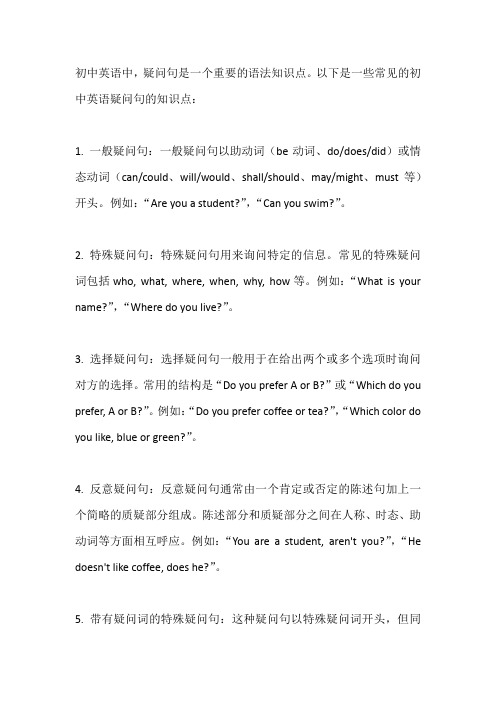
初中英语中,疑问句是一个重要的语法知识点。
以下是一些常见的初中英语疑问句的知识点:1. 一般疑问句:一般疑问句以助动词(be动词、do/does/did)或情态动词(can/could、will/would、shall/should、may/might、must等)开头。
例如:“Are you a student?”,“Can you swim?”。
2. 特殊疑问句:特殊疑问句用来询问特定的信息。
常见的特殊疑问词包括who, what, where, when, why, how等。
例如:“What is your name?”,“Where do you live?”。
3. 选择疑问句:选择疑问句一般用于在给出两个或多个选项时询问对方的选择。
常用的结构是“Do you prefer A or B?”或“Which do you prefer, A or B?”。
例如:“Do you prefer coffee or tea?”,“Which color do you like, blue or green?”。
4. 反意疑问句:反意疑问句通常由一个肯定或否定的陈述句加上一个简略的质疑部分组成。
陈述部分和质疑部分之间在人称、时态、助动词等方面相互呼应。
例如:“You are a student, aren't you?”,“He doesn't like coffee, does he?”。
5. 带有疑问词的特殊疑问句:这种疑问句以特殊疑问词开头,但同时也包含了一般疑问句的结构。
例如:“What time do you usually get up?”,“How often do you exercise?”。
学生在学习疑问句时需要注意以下几点:-疑问句的变换方式,如将陈述句转换为一般疑问句、特殊疑问句等;-特殊疑问词的使用及其不同的含义和用法;-语序的变化,特别是特殊疑问句中主语和谓语的位置变化。
七年级上册英语一般疑问句知识点
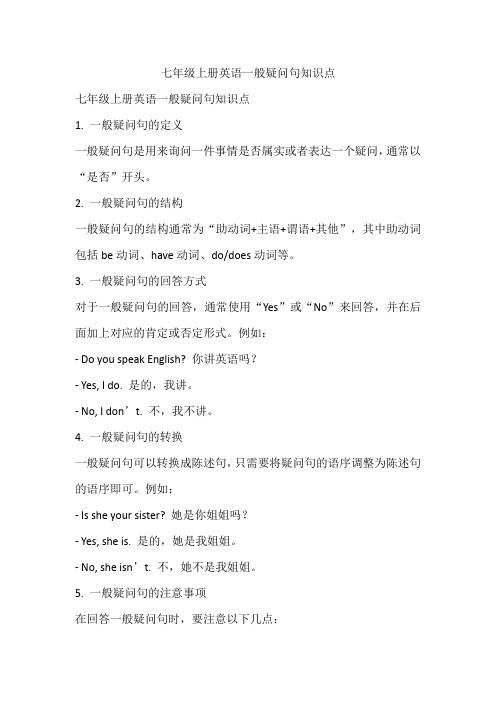
七年级上册英语一般疑问句知识点
七年级上册英语一般疑问句知识点
1. 一般疑问句的定义
一般疑问句是用来询问一件事情是否属实或者表达一个疑问,通常以“是否”开头。
2. 一般疑问句的结构
一般疑问句的结构通常为“助动词+主语+谓语+其他”,其中助动词包括be动词、have动词、do/does动词等。
3. 一般疑问句的回答方式
对于一般疑问句的回答,通常使用“Yes”或“No”来回答,并在后面加上对应的肯定或否定形式。
例如:
- Do you speak English? 你讲英语吗?
- Yes, I do. 是的,我讲。
- No, I don’t. 不,我不讲。
4. 一般疑问句的转换
一般疑问句可以转换成陈述句,只需要将疑问句的语序调整为陈述句的语序即可。
例如:
- Is she your sister? 她是你姐姐吗?
- Yes, she is. 是的,她是我姐姐。
- No, she isn’t. 不,她不是我姐姐。
5. 一般疑问句的注意事项
在回答一般疑问句时,要注意以下几点:
-首先要听清问题,并理解问题的意思;
-回答时要保持礼貌和尊重;
-对于不知道或不确定的问题,可以委婉地回答或请求对方解释;-注意时态和语序,保持语句通顺。
初中英语一般疑问句和特殊疑问句知识点讲解
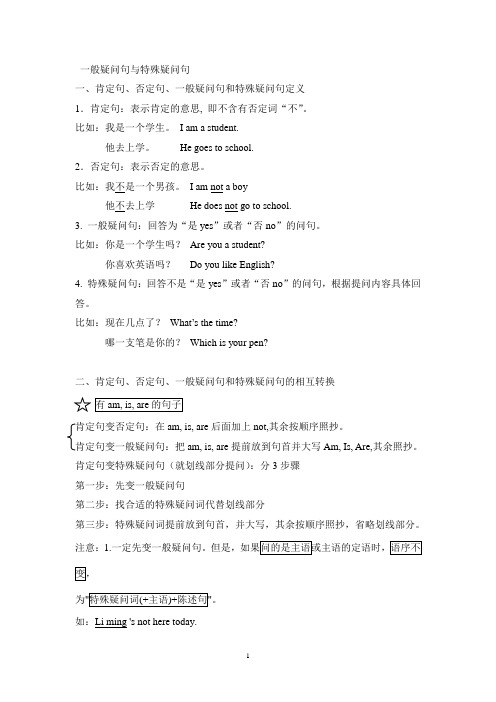
一般疑问句与特殊疑问句一、肯定句、否定句、一般疑问句和特殊疑问句定义1.肯定句:表示肯定的意思, 即不含有否定词“不”。
比如:我是一个学生。
I am a student.他去上学。
He goes to school.2.否定句:表示否定的意思。
比如:我不是一个男孩。
I am not a boy他不去上学He does not go to school.3. 一般疑问句:回答为“是yes”或者“否no”的问句。
比如:你是一个学生吗?Are you a student?你喜欢英语吗?Do you like English?4. 特殊疑问句:回答不是“是yes”或者“否no”的问句,根据提问内容具体回答。
比如:现在几点了?What’s the time?哪一支笔是你的?Which is your pen?二、肯定句、否定句、一般疑问句和特殊疑问句的相互转换am, is, are后面加上not,其余按顺序照抄。
am, is, are提前放到句首并大写Am, Is, Are,其余照抄。
肯定句变特殊疑问句(就划线部分提问):分3步骤第一步:先变一般疑问句第二步:找合适的特殊疑问词代替划线部分第三步:特殊疑问词提前放到句首,并大写,其余按顺序照抄,省略划线部分。
注意:1.如:Li ming 's not here today.Who's not here today? 今天谁没来?2.特殊疑问词。
例如:1.肯定句、否定句和一般疑问句的互换肯定句:This is a book.否定句:一般疑问句:Is this a book?肯定回答:Yes, it is.否定回答:No, it isn’t.2.就划线部分提问(变特殊疑问句)This is a book.第一步:变一般疑问句Is this a book?第二步:找合适的特殊疑问词Is this what ?第三步:特殊疑问词提前放到句首,并大写,其余按顺序照抄,省略划线部分。
七年级英语上一般疑问句

普林斯顿教育七年级英语上RJ一般疑问句(一般现在时)般疑问句是疑问句的一种。
它是只用yes(是)或no(否)来回答的句子。
其结构是:系动词be/助动词/情态动词+主语+其他成分通常回答为:肯定:Yes,+主语+提问的助动词.否定:No,+主语+提问的助动词的否定形式.1.将陈述句变为一般疑问句时,如句中有be 动词(am is are …)时,可直接将它们提至主语前。
I'm in Class 2Grade 1.→ Are you in Class 2Grade 1?We're watching TV.→ Are you watching TV?2.陈述句中有情态动词(can may must …)时,直接将它们提至主语前。
He can swim now.→ Can he swim now?The children may come with us.→ May the children come with us?3.陈述句中有实义动词作谓语时,则由do或does(第三人称单数)引导,放在句首,且后面动词需变为原形。
I like these animals.→ Do you like these animals?She wants to go to the movies.→ Does she want to go to the movies?需要直接变化的词语I /me变成you we /us变成you my变成your our变成youram变成are some变成any and变成orthis变成that these 变成those陈述句的否定形式(一般现在时)1.含有系动词的句子在变否定句时只须“在系动词的后边加上not”,前面的几个了陈述句变否定句分别为I’m a Chinese boy. → I’m not a Chinese boy.She is twelve. → She isn’t twelve.2.含有情态动词的句子(can ), 在变否定句时直接在情态动词的后边加上not She can play basketball. →She can not play basketball.His mother’s cousin can sing many English songs. →His mother’s cousin can not sing many English songs.3.○1含有行为动词的句子在变否定句时只须在行为动词前加don’t .We don’t have many friends. →We don’t have many friends.The students don’t take their books to school. →The students don’t take their books to school.○2含有行为动词的句子,当主语是第三人称单数时,变否定句时“在行为动词前面加doesn’t , 且后面动词需变为原形”。
初中英语疑问句句型分类知识点讲解
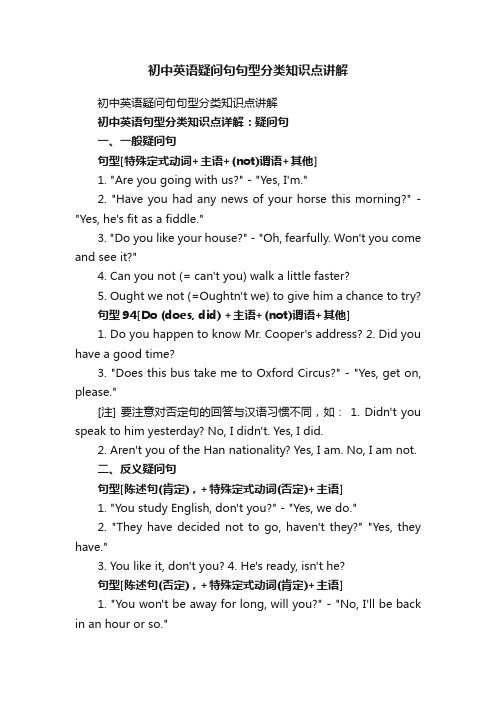
初中英语疑问句句型分类知识点讲解初中英语疑问句句型分类知识点讲解初中英语句型分类知识点详解:疑问句一、一般疑问句句型[特殊定式动词+主语+(not)谓语+其他]1. "Are you going with us?" - "Yes, I'm."2. "Have you had any news of your horse this morning?" - "Yes, he's fit as a fiddle."3. "Do you like your house?" - "Oh, fearfully. Won't you come and see it?"4. Can you not (= can't you) walk a little faster?5. Ought we not (=Oughtn't we) to give him a chance to try?句型94[Do (does, did) +主语+(not)谓语+其他]1. Do you happen to know Mr. Cooper's address?2. Did you have a good time?3. "Does this bus take me to Oxford Circus?" - "Yes, get on, please."[注] 要注意对否定句的回答与汉语习惯不同,如: 1. Didn't you speak to him yesterday? No, I didn't. Yes, I did.2. Aren't you of the Han nationality? Yes, I am. No, I am not.二、反义疑问句句型[陈述句(肯定),+特殊定式动词(否定)+主语]1. "You study English, don't you?" - "Yes, we do."2. "They have decided not to go, haven't they?" "Yes, they have."3. You like it, don't you?4. He's ready, isn't he?句型[陈述句(否定),+特殊定式动词(肯定)+主语]1. "You won't be away for long, will you?" - "No, I'll be back in an hour or so."2. "… I think I'll go into the green line. You couldn't give mea helping hand, could you, Mr. Snape?"3. "I'd like to go to Central Australia with you…. you h ave never been out of England, have you?"4. "He doesn't know anything about it, does he?" - "No, he doesn't.三、特指疑问句句型[疑问词(主语)+系词+表语]/ [疑问词(定语)+主语+行为动词+宾语]1. Who is there?2. Who gives your English lessons?3. What is in the box?4. Which is mine?5. Whose book is on the desk?6. How many students work in the workshop?7. What new products have been turned out in that factory?句型疑问词(表语/宾语/状语)+特殊定式动词+主语+行为动词…]1. Who is he?2. What is he?3. What is he like?4. What is it like?5. What kind of man is he?6. What day is today?7. What's the date today?8. What time is it now?9. How do you do?10. How are you getting along? (= how goes it with you? = how is life? = how is everything with you?11. How is your health? 12. How do you feel? 13. What's matter with you?14. Where are you going? 15. Where do you come from? 16. Where are you from?17. What's your nationality, please? 18. What family are you from?句型[疑问词+in the world/on earth/the devil/the deuce/ever等强调词语+其他]1. "What the deuce shall I write about?" - He thought.2. Whatin the world do you mean?3. Who on earth (in the world) told you that?4. Who the devil is he?5. What the deuce is the matter?6. What the dickens is it?7. Who ever wants this?四、选择疑问句句型[一般疑问句+or+一般疑问句]1. Shall we come to see you or will you come to see us?2. Are you from the South or from the North?3. Will he go on Monday or on Tuesday?4. Did you speak to them, or did the manager?5. Where's the bank? Should I go this way or that way?句型[特指疑问句,+A or B ?]1. "What would you like, Chinese or European food?" - "I don't mind one way or the other."2. Which would you rather have - steak or fish?3. Who will be your teacher, Mr. Brown or Mr. Cooper?4. Where did you spend your leave: in Shanghai or in Hangzhou?5. When will he go there, tomorrow or some other day?五、间接疑问句句型[适当的主语+疑问关联词+从句(正常语序)]1. I'd like to know how old you are.2. He inquired how it was done.3. "Guess how old I am." - "I'd say you're about twenty-three."4. I ask you what you want.5. Please advise me which book I should read first.6. Tell me why it is so important.句型[适当的`主语+if/whether+从句(正常语序)]1. I sometimes ask myself the question whether it was worththe effort.2. I ask you whether it is true or not.3. She asked if I had slept.4. Tell me whether you like it.5. He visited us next day and asked if we had got home safe.6. She inquired if he liked the post.六、双重疑问句句型一般疑问句+疑问关联词+从句(正常语序)]1. Can you tell me where he has gone?2. Have you any idea where he lives?3. May I ask you then what you would advise me to do?4. Do you know who lives here?5. Do you know when he was born?句型[疑问词+do you think/did you say/can you guess/do you suppose+其他(正常语序)]1. What will be the result, do you think?2. "How old were you then, Clyde, did you say?" "Between seventeen and eighteen."3. When do you think the meeting will be held?4. How many books, can you guess, did he buy the other day?5. What do you suppose he's hanging around here?七、修辞疑问句句型[陈述句(肯定)+反问句(肯定)]1. We're old friends, not strangers, right?2. So you've been abroad, have you?3. She's a sweet little girl, is she?4. The land reform has just reached the stage of deciding everyone's class status, so you come sucking around, do you?句型[疑问词+should+主语+动词原形+其他]1. Who should I see but my own brother?2. Who should there be?3. Why should the door be locked?4. Who/Whom should I see in the courtyard but Mr. Smith?5. "Where is Jane?" - "How should I know?"6. Why should he be angry with me?句型[Oh,/So+陈述句+反问句]1. Oh, he's here now, is he?2. Oh, you told him all about it, did you?3. So you've the luggage taken to the station, have you?4. So you're going abroad, are you?八、回响疑问句句型[A:陈述句+B:疑问句(重复A句中的部分)]1. A: I didn't like that meal. B: You didn't like it? (怀疑)2. "I'm tired." - "Are you?" (怀疑)3. A: The Browns are emigrating. B: Emigrating? (惊讶)4. A: It cost sixty dollars. B: How much did it cost? (惊讶)5. A: Switch the light off, please. B: Switch the light off, you say? / Switch what off? (反对)句型[A: 疑问句+B: 重述性疑问句]1. A: What do you think of the picture? B: What do I think of it? (怀疑)2. A: How did you enjoy the carnival? B: How did I enjoy what? (要求)3. A: How did you enjoy your holidays? B: How did I enjoy my holidays? (考虑回答)4. A: Have you borrowed my pen? B: (Have I) Borrowed your pen? (反驳)九、陈述式疑问句句型[任何陈述形式的疑问句(词序不变)]1. My friend's here?2. You wouldn't see me left here alone?3. "You followed us, then?" - "What's that to you? ..." saidJones, "Go to the devil!"4. A two million dollar building, you can't touch the walls?5. "You are not ill?" was the question put, "A little sick," replied Miss Keldar.句型[…疑问词(在剧中任何位置上)]1. "You use that position as a favorite to insult a gentleman." - "To insult a what?" said Steerforth.2. Five times what number makes twenty?3. I asked the carrier, "Are we going all the way there?" - "All the way where?" asked the carrier4. You're twenty-what (odd) this year?5. He's your who?6. Your who is a steel-worker?7. How old a child could draw this? 8. He is your son of what number?。
初一英语语法知识点讲解:一般疑问句

→ AreyouanEnglishteacherEg7.WecanspeakEnglish fluently.→CanyouspeakEnglishfluently2、第二 家族:含行为动词(或称为实义动词)的句子秘诀: 一加二改三问号一加:即在句首加助动词 Do 或 Does;二改:1、把谓语动词改为原形;2、改换主
’
sfatherlistentoEnglishontheradioeveryevenin
0c63f7e 易博
g 特别注意:对于第二家族一定要注意动词的还原, 因为时态与数的变化已经体现在助动词上了。3、 加强记忆口诀:“肯变一,并不难,can 或 be 提在 前;谓语若为行为动,do 或 does 句首用。”
语称谓(同第一家组);三问号:句末的句号改为
问 号 。 Eg8.WereadEnglisheverymorning. →
DoyoureadEnglisheverymorningEg9.Tom
’
sfatherlistenstoEnglishontheradioeveryeveni
ng.
→
DoesTom
否答:No,theydon’t.三、一般疑问句的回答正 如前面所述,回答一般疑问句时有肯定回答和否定 回答两种方式,肯定回答以 Yes 起句,否定回答用 No 开头。但对一般疑问句的回答也不是一成不变 的∠定回答还可以用 OK./Certainly.等;否定回 答可用 Sorry./Sorry,Ican`t.等。Eg5.问句:
0c63f7e 易博
CanyouspeakEnglish 肯答:Certainly\Ofcourse. 否答:Sorry,Ican’t.四、一般疑问句的语调朗读 一般疑问句时用升调,而一般疑问句的简略答语则 用降调。五、如何将陈述句变为一般疑问句根据一 般疑问句不同的家族,可以用不同的方法将陈述句 变为相应的一般疑问句。1、第一家族:含 be 动词
初中英语语法知识点讲解一般疑问句

初中英语语法知识点讲解一般疑问句一般疑问句是英语中常用的一种问句形式,用来提出对一些陈述句的疑问或询问事实、情况。
一般疑问句的特点是在句首使用助动词或情态动词来完成疑问句的构建。
以下是一般疑问句的常见知识点:1.助动词的使用:一般现在时:do / does一般过去时:did一般将来时:will现在进行时:am / is / are过去进行时:was / were例如:- Do you like pizza? (你喜欢披萨吗?)- Did she go to the party? (她去参加派对了吗?)- Will they visit their grandparents tomorrow? (他们明天会去拜访祖父母吗?)- Is he playing soccer now? (他现在在踢足球吗?)- Were you studying yesterday? (你昨天在学习吗?)2.情态动词的使用:can / could / may / might / must / should / would / shall / will例如:- Can you swim? (你会游泳吗?)- Should we go to the concert tonight? (我们今晚应该去听音乐会吗?)- Would you like some tea? (你想喝些茶吗?)- Must she finish her homework before going out? (她必须在出门前完成作业吗?)3.特殊疑问词的使用:在构建一般疑问句时,如果需要询问特定信息,常会使用特殊疑问词来引导。
常见的特殊疑问词有:what、where、when、why、how、who等。
例如:- Where is the post office? (邮局在哪里?)- When did they arrive at the airport? (他们什么时候到达机场的?)- Why are you crying? (你为什么哭?)- How do you get to school? (你怎么去学校的?)- Who is your favorite singer? (你最喜欢的歌手是谁?)。
九年义务初中英语一般疑问句知识点归纳总结
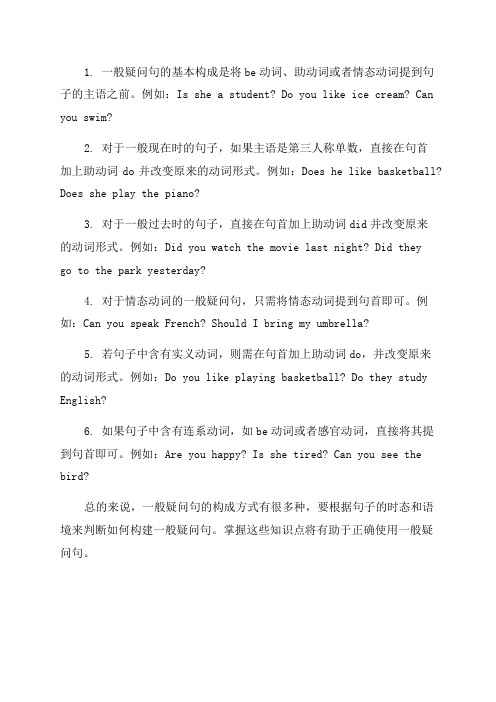
1. 一般疑问句的基本构成是将be动词、助动词或者情态动词提到句
子的主语之前。
例如:Is she a student? Do you like ice cream? Can you swim?
2. 对于一般现在时的句子,如果主语是第三人称单数,直接在句首
加上助动词do并改变原来的动词形式。
例如:Does he like basketball? Does she play the piano?
3. 对于一般过去时的句子,直接在句首加上助动词did并改变原来
的动词形式。
例如:Did you watch the movie last night? Did they
go to the park yesterday?
4. 对于情态动词的一般疑问句,只需将情态动词提到句首即可。
例如:Can you speak French? Should I bring my umbrella?
5. 若句子中含有实义动词,则需在句首加上助动词do,并改变原来
的动词形式。
例如:Do you like playing basketball? Do they study English?
6. 如果句子中含有连系动词,如be动词或者感官动词,直接将其提
到句首即可。
例如:Are you happy? Is she tired? Can you see the bird?
总的来说,一般疑问句的构成方式有很多种,要根据句子的时态和语
境来判断如何构建一般疑问句。
掌握这些知识点将有助于正确使用一般疑
问句。
一般疑问句规则
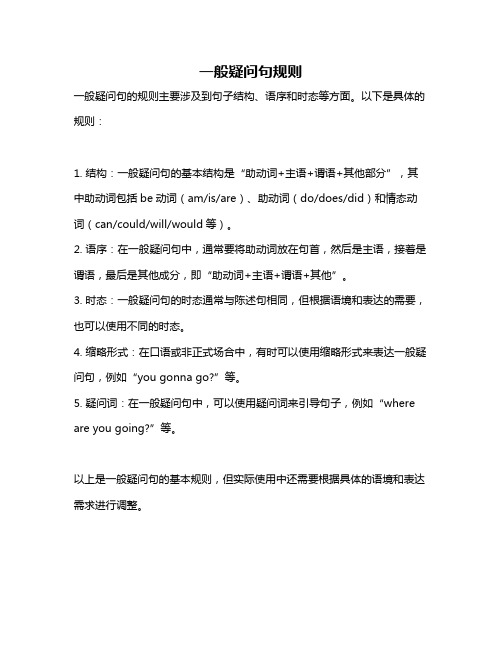
一般疑问句规则
一般疑问句的规则主要涉及到句子结构、语序和时态等方面。
以下是具体的规则:
1. 结构:一般疑问句的基本结构是“助动词+主语+谓语+其他部分”,其中助动词包括be动词(am/is/are)、助动词(do/does/did)和情态动词(can/could/will/would等)。
2. 语序:在一般疑问句中,通常要将助动词放在句首,然后是主语,接着是谓语,最后是其他成分,即“助动词+主语+谓语+其他”。
3. 时态:一般疑问句的时态通常与陈述句相同,但根据语境和表达的需要,也可以使用不同的时态。
4. 缩略形式:在口语或非正式场合中,有时可以使用缩略形式来表达一般疑问句,例如“you gonna go?”等。
5. 疑问词:在一般疑问句中,可以使用疑问词来引导句子,例如“where are you going?”等。
以上是一般疑问句的基本规则,但实际使用中还需要根据具体的语境和表达需求进行调整。
初中英语语法知识点讲解:一般疑问句
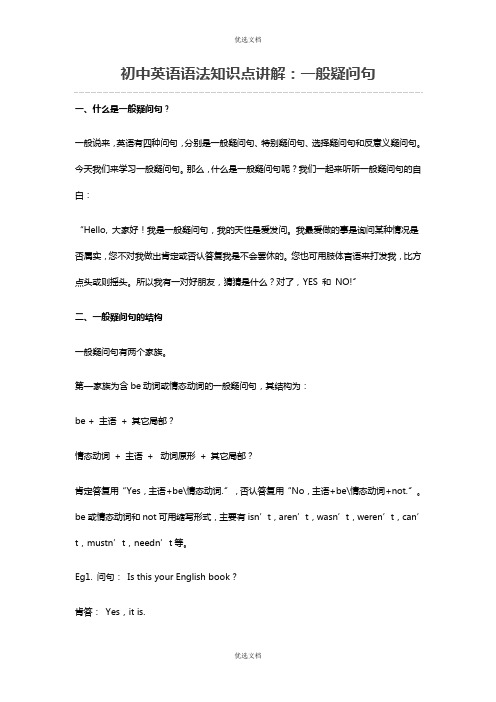
一、什么是一般疑问句?一般说来,英语有四种问句,分别是一般疑问句、特别疑问句、选择疑问句和反意义疑问句。
今天我们来学习一般疑问句。
那么,什么是一般疑问句呢?我们一起来听听一般疑问句的自白:“Hello, 大家好!我是一般疑问句,我的天性是爱发问。
我最爱做的事是询问某种情况是否属实,您不对我做出肯定或否认答复我是不会罢休的。
您也可用肢体言语来打发我,比方点头或则摇头。
所以我有一对好朋友,猜猜是什么?对了,YES 和NO!〞二、一般疑问句的结构一般疑问句有两个家族。
第—家族为含be动词或情态动词的一般疑问句,其结构为:be + 主语+ 其它局部?情态动词+ 主语+ 动词原形+ 其它局部?肯定答复用“Yes,主语+be\情态动词.〞,否认答复用“No,主语+be\情态动词+not.〞。
be或情态动词和not可用缩写形式,主要有isn’t,aren’t,wasn’t,weren’t,can’t,mustn’t,needn’t等。
Eg1. 问句:Is this your English book?肯答:Yes,it is.否答:No,it isn`t.Eg2. 问句:Are these your English books?肯答:Yes,they are.否答:No,they aren’t.Eg3. 问句:Can you speak English肯答:Yes,I can.否答:No,I can’t.注意例句1和例句2,在答复时必须将this\that与these\those分别变为it和they。
另一家族为含行为动词〔或称为实义动词〕的一般疑问句,其结构为:助动词+ 主语+ 动词原形+ 其它?肯定答复用“Yes, 主语+ do\does.〞,否认答复用“No, 主语+don\does not.〞。
助动词也常用缩写形式,主要有don’t,doesn’t,didn’t等。
Eg4. 问句:Do your parents like English?肯答:Yes,they do.否答:No,they don’t.三、一般疑问句的答复正如前面所述,答复一般疑问句时有肯定答复和否认答复两种方法,肯定答复以Yes起句,否认答复用No开头。
初中语法专题(句子类型)一般疑问句知识点综合讲解及习题专练归纳总结(完整版)

初中语法专题(句子类型)一般疑问句知识点综合讲解及习题专练归纳总结(完整版)1.定义:一般疑问句是疑问句中的一种,用来进行提问。
可以用yes或no来作肯定和否定回答,注意,两种回答主语都只能为代词,其中否定回答只能用缩写,不能用全称,但am not例外,因为它没有缩写。
2.类型:(1) 含有be动词(am/is/are/was/were)的陈述句变为一般疑问句,直接把be动词提到句首,然后把“.”变“?”即可,其中第一人称I和we要相应的变为第二人称you。
肯定及否定回答用相对应的be动词来回答就可以了;e.g. ①陈述句: I am a student.一般疑问句: Are you a student?肯定回答: Yes, I am.否定回答: No, I am not.②陈述句: Mary is isn’t go od at English.一般疑问句: Is Mary not good at English?肯定回答: Yes, she is.否定回答:No, she isn’t.③陈述句: They are classmates.一般疑问句: Are they classmates?肯定回答: Yes, they are.否定回答:No, they aren’t.④陈述句: Tom and Mary were friends before.一般疑问句: Were Tom and Mary friends before?肯定回答: Yes, they were.否定回答: No, they weren’t.(2) 含有情态动词(can / could / may / might / will / would / should / must / need / dare等)的陈述句变为一般疑问句直接把情态动词提到句首,然后把“.”变“?”即可, 其中第一人称I和we要相应的变为第二人称you。
语法点一般疑问句和特殊疑问句讲解

一般疑问句一、什么是一般疑问句1.定义:用Yes或No作答的疑问句叫一般疑问句;2.特点:1、以be动词、助动词或情态动词开头;eg: Is your father a teacherDoes Catherine like animalsCan Jenny speak French2、往往读升调;3、译成汉语,都可以带上“吗”eg: 上面三句可分别译为:你父亲是老师吗凯瑟琳喜欢动物吗詹妮会说法语吗二.陈述句和一般疑问句间的转换要将陈述句变成一般疑问句,可以遵循下列步骤:1.看句中有没有be动词am、is、are、was、were助动词do、does、did、have、had或情态动词can、must、will、may等,如果有,将其提到句首,句末打上问号即可;eg: It was rainy yesterday.→Was it rainy yesterdayTom's father can play the piano.→Can Tom's father play the pianoI have finished my homework.→Have you finished your homework2.如果句中没有be动词、助动词或情态动词,则根据谓语动词的形式借助do的相应形式放在句首;具体方法是:如果谓语动词是原形,则借do;如果谓语动词是一般现在时第三人称单数形式,则借does;如果谓语动词是过去式,则借did. 需要注意的是,借does或did后,原句的谓语动词要变回原形;eg:They go to school by bike.→Do they go to school by bikeBill gets up at 6:30 every day.→Does bill gets up at 6:30 every dayThe students saw a film yesterday.→Did the students see a film yesterday陈述句变一般疑问句应注意的事项陈述句变成一般疑问句除了遵循上述规则以外,还应注意下列几点:1.如果陈述句中有第一人称,则变问句时最好要变为第二人称;eg:I usually have lunch at school.→Do you usually have lunch at schoolMy father is playing soccer.→Is your father playing soccer2.如果陈述句中有some, 则变问句时往往要变成any ;eg:There is some water on the playground.→Is there any water on the playground3.复合句变一般疑问句通常只变主句,从句不变;eg:I know he comes from Canada.→Do you know he comes from Canada三.一般疑问句往往采用简短回答由三部分三个单词组成,对这三部分三个单词的确定可以概括例下:1.第一个词:不是Yes就是No;有时根据语气的不同,Yes可由Sure, Certainly, Of course等代替.NO可由sorry 代替.2.第二个词:问谁答谁;即答语中的主语须与问句的主语一致但必须用主格代词;eg:Does she clean her room every day Yes, she does.Is Anna′s father a doctor No,he isn′t.如果主语是this that,回答时用it 代替,如果问句中主语these, those, 回答时用they′ 代替;3.第三个词:用什么问,用什么答;即沿用问句中的引导词;Can Jim play soccer Yes, he can.Does Mr Bean speak English Yes, he does.需要注意问题:1.用may 引导的问句,肯定回答用may,否定回答用can′t 或mustn′t用must 引导的问句,肯定回答用must,否定回答用needn′t.eg:May I go to the park nowYes, you may. /No, you mustn′t.Must I wash my clothes nowYes, you must. /No, you needn′t.4.用No开头作否定回答时,结尾要加上not;因为回答必须是三部分, 所以否定回答必须缩写,而肯定回答不能缩写;eg:Did Thomas come here yesterdayYes, he did./ N o ,he didn′t.Is Lin Lin in Class 3Yes, she is. / No, she isn′t.或No, she′s not.一般疑问句练习题1. His father is an English teacher.2. These cats are crying.3. They can swim.4. I like to read English.5. I go to school on foot.6. He likes English.7. His father goes to work by bus.8. He is crying under the tree.9. His birthday is on the twentieth of November.10. Mrs. Li and Kitty are in a big shop.11. Kitty is wearing her new uniform.12. The boy under the tree is hungry.13. He goes to school every day.15. I want to have a model car.16. She wants a cup of coffee.17. Mrs. Li and Kitty watch television at night.18. I do my homework after school.特殊疑问句一. 定义:以疑问词开头,对句中某一成分提问的句子叫特殊疑问句;常用的疑问词有:what, what color, what nationality, what day, who 二.构成①特殊疑问词+助动词+主语+动词原形+其他eg:Where do you do study English②特殊疑问词+be动词+主语+其他eg:Why is your Mum so angry③特殊疑问词+情态动词+主语+动词原形+其他eg:What can I do for you三.回答特殊疑问句时,不能用yes /no,即问什么答什么,尤其是简略回答;如:-Who is from Canada﹖-Helen is.- Where's the restaurant﹖- Near the station.-Why do you like koalas﹖-Because they are cute.单词意思用法when什么时间问时间who谁问人whose谁的问主人where在哪里问地点which哪一个问选择why为什么问原因what什么问东西what time什么时间问时间what colour什么颜色问颜色what about…怎么样问意见what day星期几问星期what date什么日期问具体日期what for为何目的问目的how…怎么样问情况how old多大问年龄how many多少问数量how much多少问价钱how about…怎么样问意见how far多远问路程特殊疑问句练习题一1._____ is that pretty girl She is my sister.2.._____ are Jack and Tom They are behind you.do you go to school I go to school from Monday to Friday.has a beautiful flower John has a beautiful flower.are they They are my parents.is my mother She is in the living room.are you going We are going to the bakery面包坊.do Jim and Wendy play ball They play ball in the afternoon.does he jog He jogs in the park.are you from I'm from Changchun city.1、A: _______ is the boy in blueB:He’s Mike.2、A: _______ wallet is it B:It’s mine.3、A: _______ is the diary B:It’s under the chair.4、A: _______ is the Chirstmas Day B: It’s on the 25th of December.5、A: _______ are the earphonesB:They are 25 yuan.6、A: _______ is the hairdryerB:It’s blue.7、A: _______ is it todayB:It’s Sunday.8、A: _______ was it yesterday B: It was the 13th of October.9、A: _______ this red oneB:It’s beautiful.10、A: _______ is it from here B:It’s about two kilometre away.11、A: Can I have some paper and some crayonsB: _______ A: I want to make a kite.12、A:_______ one is fatter, the blue one or the red one B: The blue one.13、A:_______ is your cousinB: He’s 15 years old.14、A:_______ do you have dinner B: At 6 o’clock.二、就画线部分提问is my father.are under the tree.often watch TV after dinner.晚饭后提示:饭后强调的是时间问题; swims in the swimming pool.游泳池flies in the sky.often brush my teeth in the evening.likes to play with Bill.'s father plays badminton羽毛球every weekend.supermarket is near the school.laptop笔记本电脑is on the table.has a pair of earrings耳环.flowers are in the flower pot花盆.grandpa took us to the zoo.put the gold fish金鱼into the fish tank鱼缸.monkey sleeps at night.。
- 1、下载文档前请自行甄别文档内容的完整性,平台不提供额外的编辑、内容补充、找答案等附加服务。
- 2、"仅部分预览"的文档,不可在线预览部分如存在完整性等问题,可反馈申请退款(可完整预览的文档不适用该条件!)。
- 3、如文档侵犯您的权益,请联系客服反馈,我们会尽快为您处理(人工客服工作时间:9:00-18:30)。
育龙科教英语培训中心
一般疑问句定义:能以yes, no 来回答的问句 例 ① Are you a teacher? → Yes, I am./ No, I am not. ② Is she from Shanghai? → Yes, she is./ No, she isn’t.
①找Vbe / V情
①I am a student. → I am not a student. ②She is from China. → She isn’t from China. ③Lucy is a girl. → Lucy isn’t a girl. ④He is ten. → He isn’t ten. ⑤I can swim. → I can swim. ⑥He can play basketball.→ He can’t play basketball. ⑦He speaks English. → He Does speak English. ⑧She comes from Japan.→ She comes from Japan 变否定句规则: ①有Vbe / V情在其后直接加not ②无Vbe / V情根据句中动词选择相应的助动词并在 其后加“not”. ③动词还原
②把Vbe / V情提前到主语前
③句末加问号 例 ① He is Tom. → Is he Tom? ② She is a teacher. → Is she a teacher? ③ They are from China. → Are they from China? ④ I can see a dog. → Can you see a dog. 有Vbe / V情直接提到主语前
⑦ They are good friends. → Are they good friends? ⑧ It has a long neck. → Does it have a long neck? ⑨ You have a round face. → Do you have a round face? ⑩ I have a wide mouth. → Do you have a wide mou she from Canada? ② They are from China → Are they from China? ③ LiMing is a student. → Is Liming a student? ④ He comes from England. → Does he come from England? ⑤ She is twelve → Is she twelve? ⑥ This is a map. → Is this a map?
①She has two books. →Does she have two books? ②Kangkang has short hair. →Does Kangkang have short hair? ③He speaks English. →Does he speak English?
肯定:Yes, 主语+Vbe 否定:No, 主语+Vbe +not 例 ① Are you Jane? → Yes, I am. / No, I am not. ② Is she from Shanghai? → Yes, she is. / No, she isn’t.
例 ① I like English. → Do you like English? ② She has a big nose → Does she have a big nose. 句中无Vbe / V情找助动词帮忙 ①根据原句中动词确定助动词;原句中“V原”时, 在一般疑问句中用do; V-s/V-es时,在一般疑问 句中用does ②把助动词提到主语前 ③句中有助动词,动词要还原
